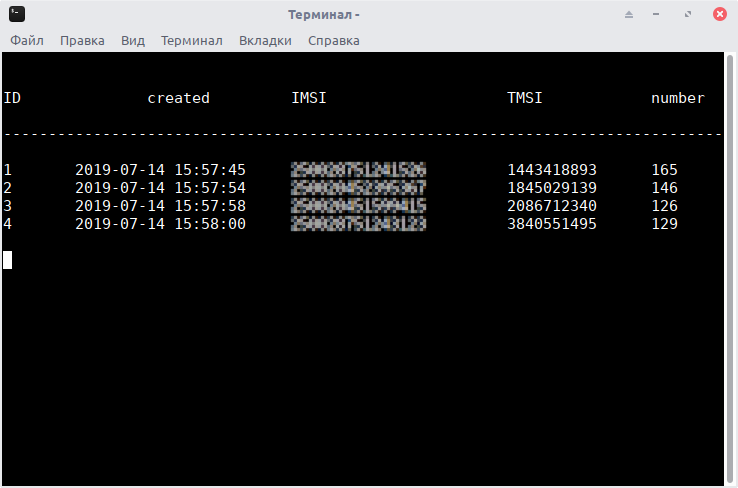This project is created for easy deployment of Osmocom GSM stack and convenient interaction with users
- E(GPRS) support
- Asterisk support
- monitoring online subscribers
- automatic interaction with new users, like sms, ussd or call
- manual interaction with individual users
- USSD-broadcast
- SMS-broadcast
- SMS-spam ;)
All software was tested on LimeSDR-Mini + Orange Pi Zero with Armbian Bionic. Also with Debian 10
Installing LimeSuite
apt install git g++ cmake libsqlite3-dev libi2c-dev libusb-1.0-0-dev
git clone https://github.com/myriadrf/LimeSuite.git
cd LimeSuite
mkdir builddir && cd builddir
cmake ../
make -j4
sudo make install
sudo ldconfig
cd ../udev-rules/
sudo sh LimeSuite/udev-rules/install.sh
cd ~/
Adding the Osmocom repository
sudo su
wget http://download.opensuse.org/repositories/network:/osmocom:/latest/Debian_10//Release.key
apt-key add Release.key
rm Release.key
echo "deb http://download.opensuse.org/repositories/network:/osmocom:/latest/Debian_10/ ./" > /etc/apt/sources.list.d/osmocom-latest.list
apt update
exit
Installing
sudo apt install osmocom-nitb osmo-trx-lms osmo-bts-trx osmo-ggsn osmo-sgsn osmo-pcu osmo-sip-connector libsofia-sip-ua-glib-dev asterisk sqlite3 libsmpp1 telnet python3-pip
sudo pip3 install smpplib
It is necessary to install Osmocom stack from apt, because it configure Systemd services. If you compile osmocom from sources, you need to install Systemd services by yourself with script install_services.sh
sudo ./install_services.sh
Stopping launched services after installation
sudo su
systemctl stop osmocom-nitb
systemctl stop osmo-nitb
systemctl stop osmo-trx-lms
systemctl stop osmo-bts-trx
systemctl stop osmo-ggsn
systemctl stop osmo-sgsn
systemctl stop osmo-pcu
systemctl stop osmo-sip-connector
systemctl stop asterisk
exit
Disabling service autostart
sudo su
systemctl disable osmocom-nitb
systemctl disable osmo-nitb
systemctl disable osmo-trx-lms
systemctl disable osmo-bts-trx
systemctl disable osmo-ggsn
systemctl disable osmo-sgsn
systemctl disable osmo-pcu
systemctl disable osmo-sip-connector
systemctl disable asterisk
Cloning
git clone https://github.com/DrLafa/osmo-nitb-scripts
All osmocom config files stored in config/ folder and updating everytime when you start main.py. You can change it by youself.
For easy setup of user-interactivity you can use config.json
- config.json example
{
"scripts":{
"sms":{
"enabled": false,
"sender_extension": "John Connor",
"message":[
"If you are reading this, then you are resistance"
]
},
"ussd":{
"enabled": false,
"ussd_type": 1,
"message":[
"Welcome to our l33t hax0r network.",
"If you are reading this, then you are true L33T 1337 H4xXx0r"
]
},
"call":{
"enabled": true,
"caller_extension": 666,
"voice-file": "tt-monkeys"
}
}
}
Send sms to new users. When user connect to network, script choose 1 random message from message section and sending it from extension sender_extension
Send ussd to new users. Script choose 1 random message from message section adn sending it to user
Make a call to new user. This function works only with Asterisk support. voice-file is 16-bit 8 kHz wav file. If caller_extension is false, then the user sees that the phone is not defined.

